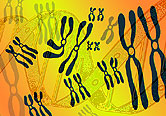Abnormal findings on early test don’t always indicate birth defects, researchers say
TUESDAY, July 14, 2015 (HealthDay News) — Abnormal results on noninvasive prenatal genetic tests may indicate maternal cancers rather than a medical issue with the fetus, according to research published online July 13 in the Journal of the American Medical Association.
Diana Bianchi, M.D., executive director of the Mother Infant Research Institute at Tufts Medical Center in Boston, and colleagues looked at 125,426 samples from women who had noninvasive prenatal testing (NIPT) between 2012 and 2014. Of that number, more than 3,757 had positive results for one or more abnormalities in five different chromosomes linked with birth defects. Later, 10 of these women were diagnosed with cancer.
The more fetal abnormalities the test picked up, the greater the likelihood that the pregnant woman had cancer, Bianchi found. Normally, the test may pick up one abnormality, she told HealthDay. “But seven of the 10 women had more than one,” which is unusual. “If it’s just a single abnormality, it’s much less likely to be cancer,” she said.
The chance that the abnormal NIPT result is due to cancer is small, Roberto Romero, M.D., D.Med.Sci., chief of the perinatology research branch at the U.S. National Institute of Child Health and Human Development of the National Institutes of Health, told HealthDay. He reviewed the findings and wrote an editorial to accompany the study. For women, the bottom line is that if the results of the blood test come back abnormal, they should next have a diagnostic test, such as amniocentesis, according to Romero. “An important message is that the NIPT is not a screening test for cancer during the pregnancy,” he said.
Funding for the study was provided by Illumina, a company that makes a noninvasive prenatal test. Bianchi is a member of an advisory panel for Illumina.
Copyright © 2015 HealthDay. All rights reserved.








